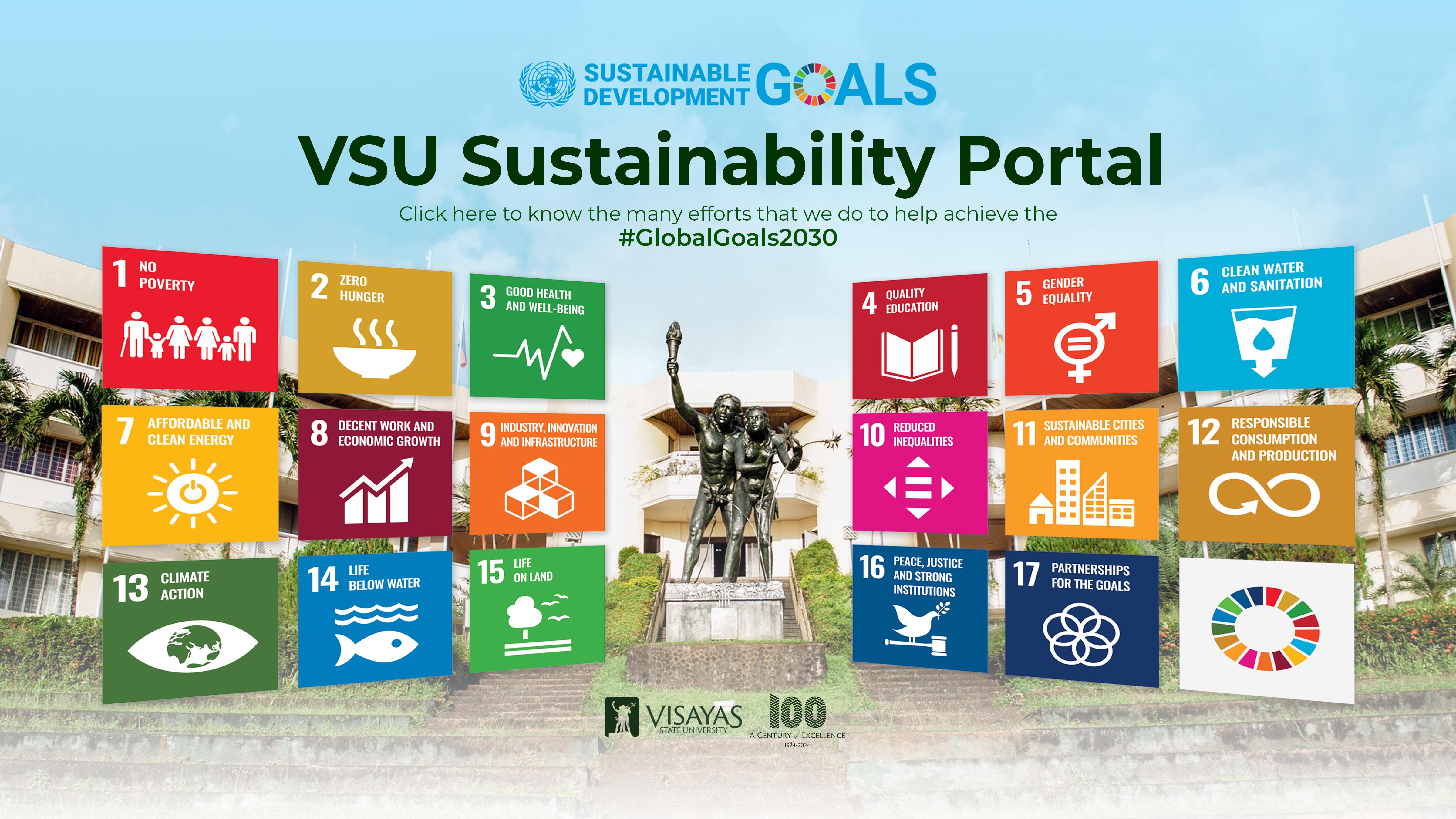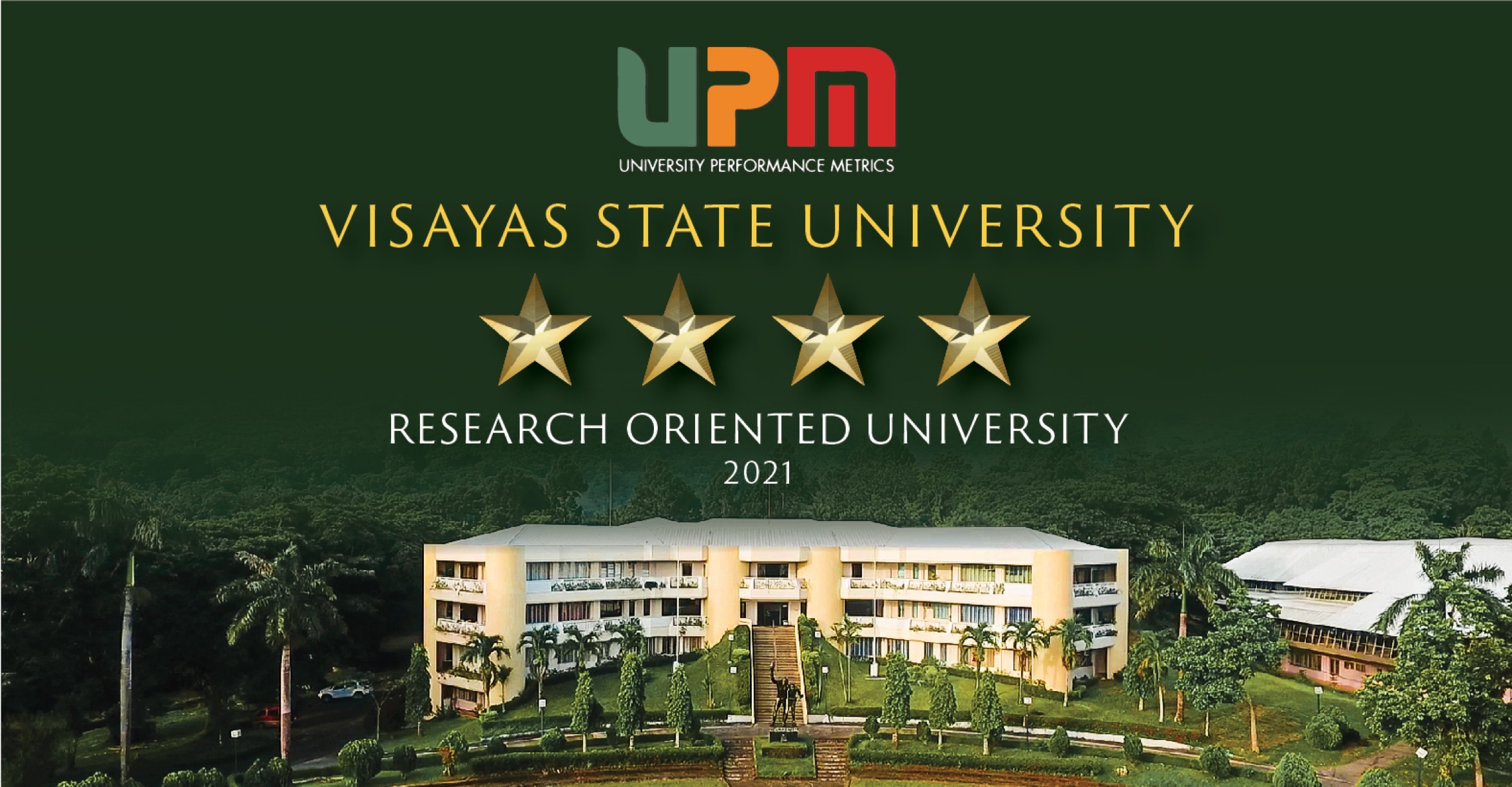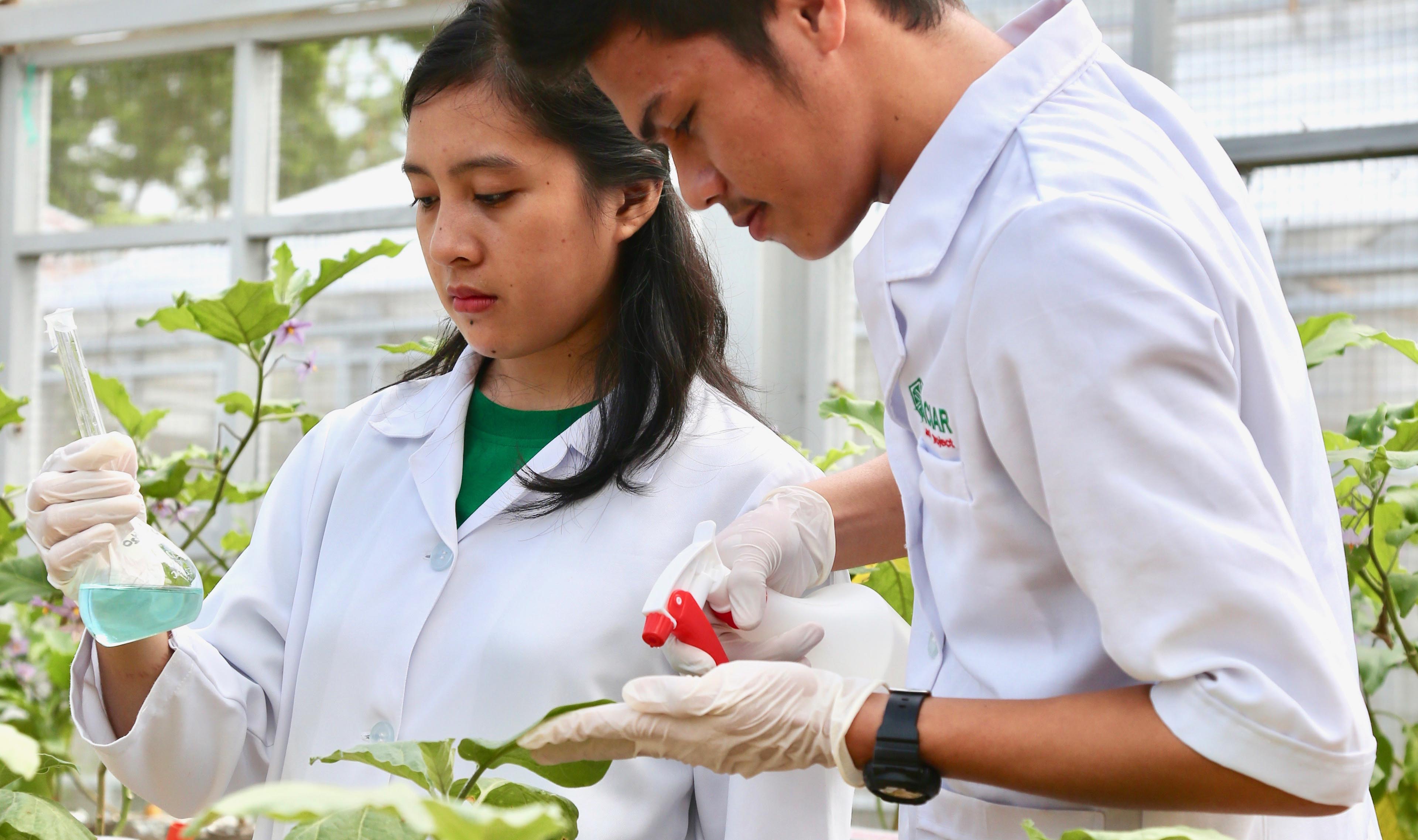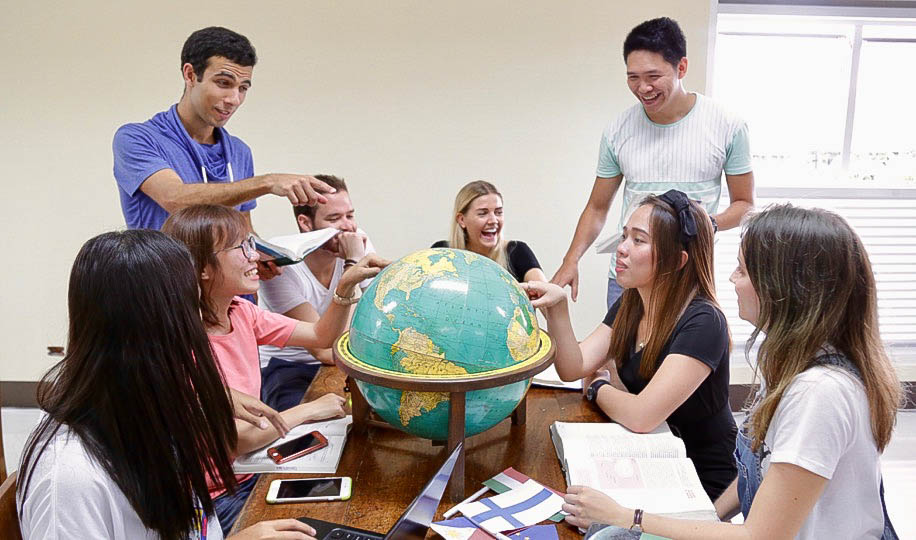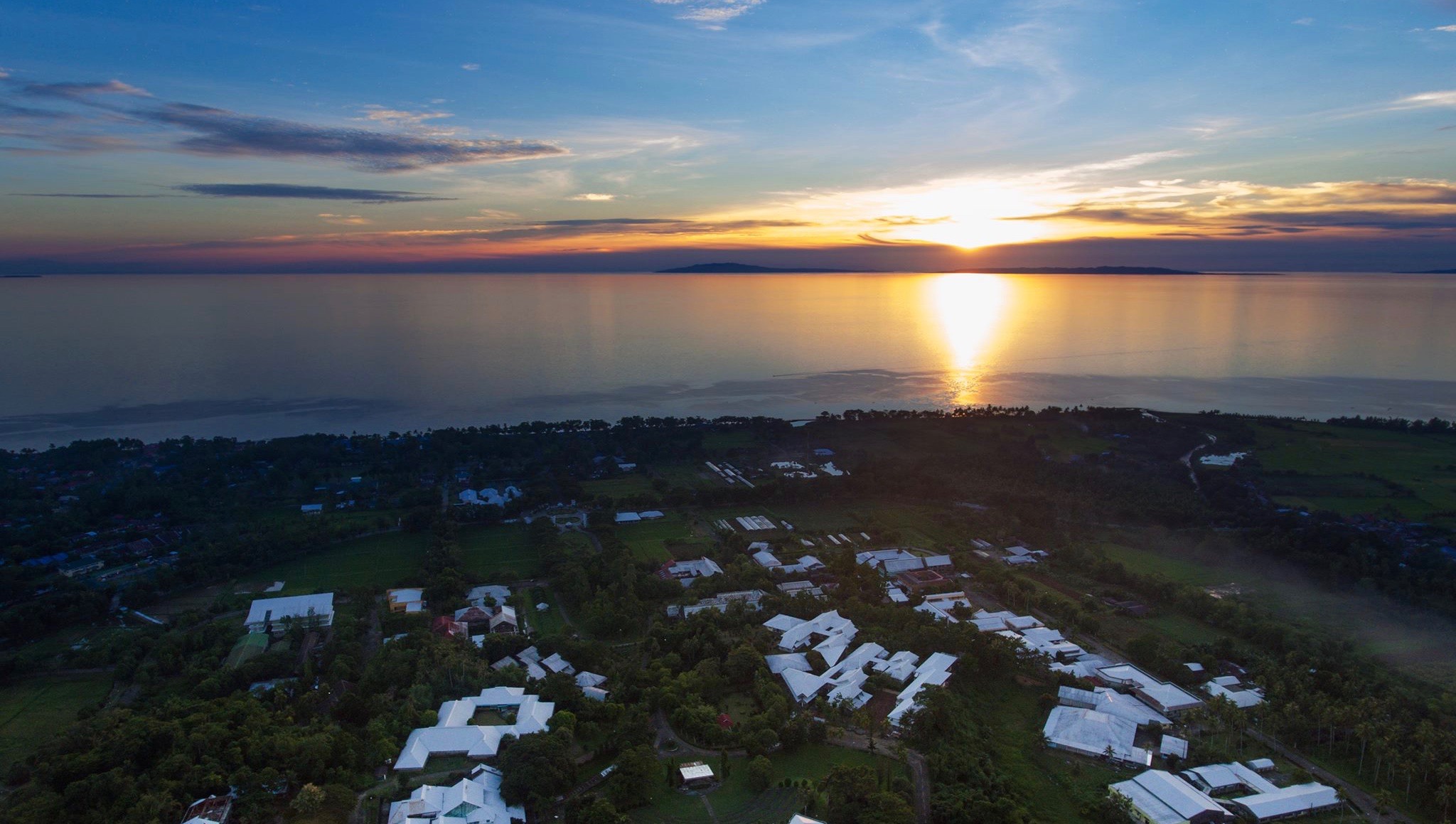Informational
The VSU (main campus) is situated in Barangay Pangasugan, 8 km north of the City of Baybay, Leyte and 34 km south of Ormoc City. It is accessible from both directions because the national road cuts across the University campus. It can also be reached from various points in Leyte either by air through Tacloban City airport (116 km away) or by sea through the ports of Baybay City, Ormoc City, Hilongos (43 km), and Bato (50 km).
Manpower Capabilities
As of January 2002, the VSU main campus had a total of 261 faculty members (95 PhDs, 115 MS, and 51 BS), 175 (67%) of whom had permanent employment status. Some (52) members of the faculty were detailed in research centers and two were on secondment.
There were 296 (1 Ph.D., 15 MS, 126 BS, 44 graduate of certificate courses, 30 college level, 71 high school level, and 9 elementary level) regular administrative staff.
Physical Features
The VSU-Main Campus has a total land area of 1,099.4 hectares that extends from the shore of Camotes Sea to the top of Mt. Pangasugan. It comprises the following:
- Campus Grounds - 61.6 ha.
- Research/Experiments - 94.0 ha.
- Instruction - 3.0 ha.
- Production Area - 104.3 ha.
- Pasture Area - 114.0 ha.
- Forest Reservation - 574.2 ha.
- Coconut - 62.3 ha.
- Abaca - 25.0 ha.
- Rice - 7.0 ha.
- Orchard - 5.0 ha.
- Corn - 3.0 ha.
- Coffee - 2.0
- Roads, Creeks/Marshy Areas - 44.0 ha.
Buildings
The University main campus has 188 buildings: 21 student dormitories, 75 staff houses, 17 academic buildings, 2 Administration buildings, and 63 others which include the Main Library, Student Union, Convention Center, Center for Continuing Education, Infirmary, Guesthouse, Hostel, Pavilion, Cebu and Manila offices, market, cafeteria, high school, elementary, workshop, DA auxiliary, gymnatorium, marine laboratory, fuel depot, powerhouse, motor pool, garage, nurseries, barns, and 9 research/training centers as follows:
- Philippine Root Crop Research and Training Center (PRCRTC)
- National Abaca Research Center (NARC)
- National Coconut Research Center (NCRC) - Visayas
- Farm and Resource Management Institute (FARMI)
- Institute for Strategic Research and Development Studies (ISRDS)
- Philippine Carabao Center (PCC) - Leyte
- Agricultural Training Institute-National Training Center (ATI-NTC) - Visayas
- Multi-Media Development Center (MMDC)
- Institute of Tropical Ecology and Environmental Management (ITEEM)
The VSU Colors
The VSU colors are green and gold. Green represents nature and the freshness of approach in any academic venture including production or collaboration; gold for the resources and achievements because of excellence in all its endeavors.
The VSU Seal
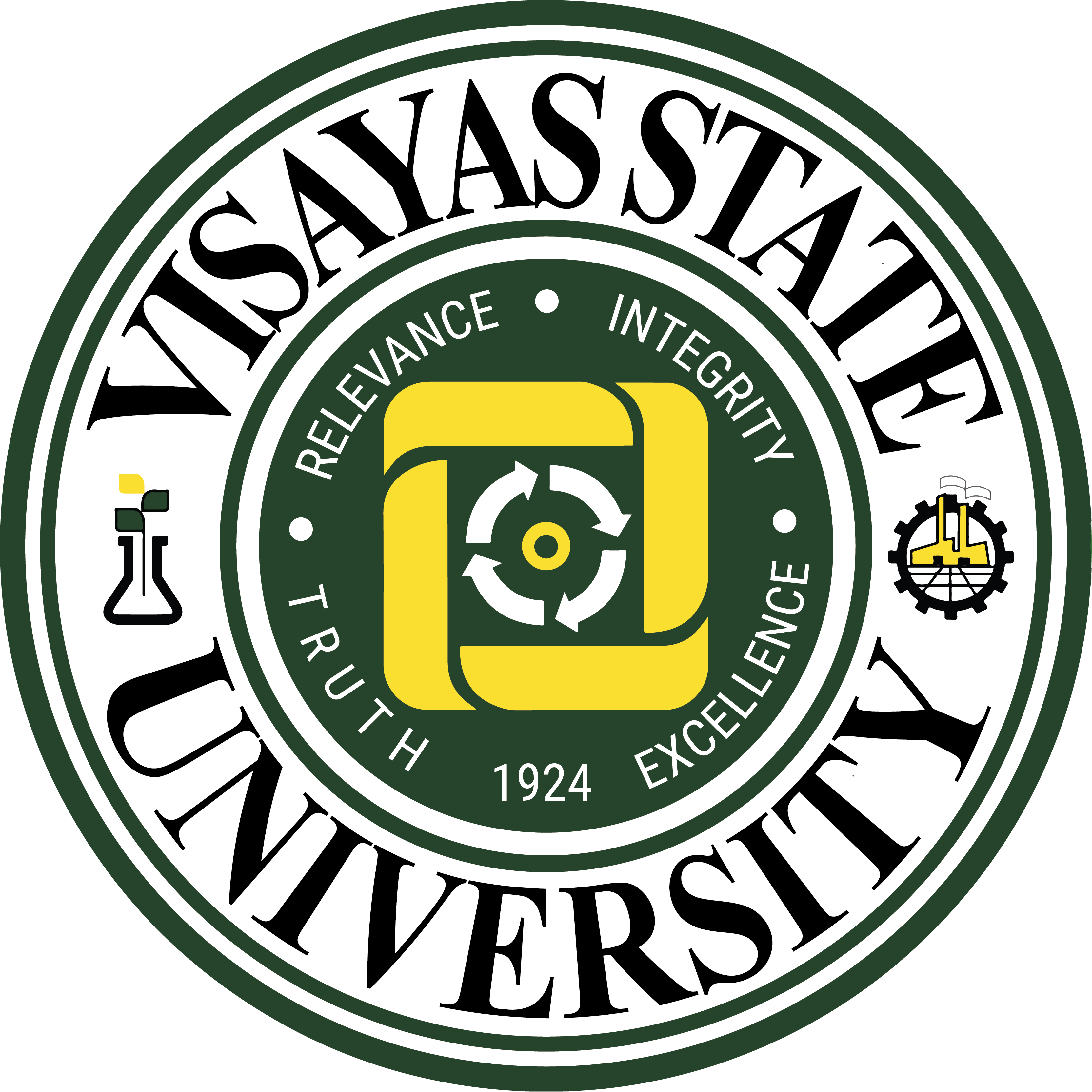
The circular seal of the University bears the university's name, colors, the years 1924 when the institution was established, a flask with a plant in it on the left side symbolizing agriculture and other fields, and industry. The four interlocking columns forming a square at the middle of the seal depict the four major functions of the University which are instruction, research, extension, and production; and the arrows at the core indicate the basic principles essential to VSU's growth, which are creativity, mutual cooperation, dynamism, and systems approach in problem solving.
The VSU Emblem
The VSU emblem bears the VSU colors and seal and heralds the University's chartered existence, dedication, and strong commitment to education.
The Twin Obelisks
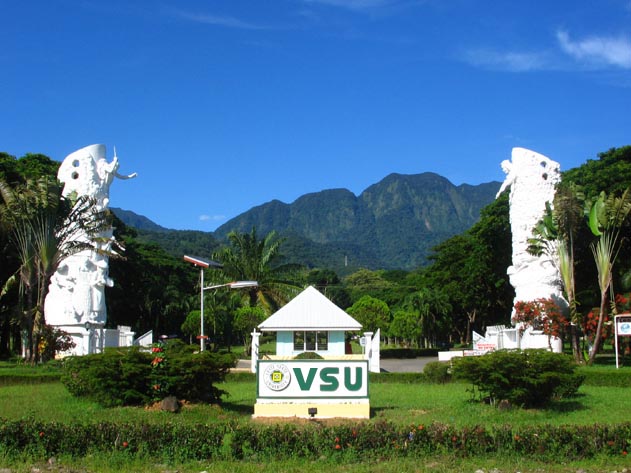
The twin white obelisks at the Main Campus entrance are among VSU's important landmarks that symbolize the academic programs and rural development mandate of the University.
Both structures depict VSU's acknowledgement of providential intervention in pursuit of its programs. The obelisk at the south bears an image of the "god of the sun" and represents the field of agriculture and allied fields. The other obelisk with the "god of lightning and thunder" represents the technology and innovation in all its endeavors.
The Search for Truth
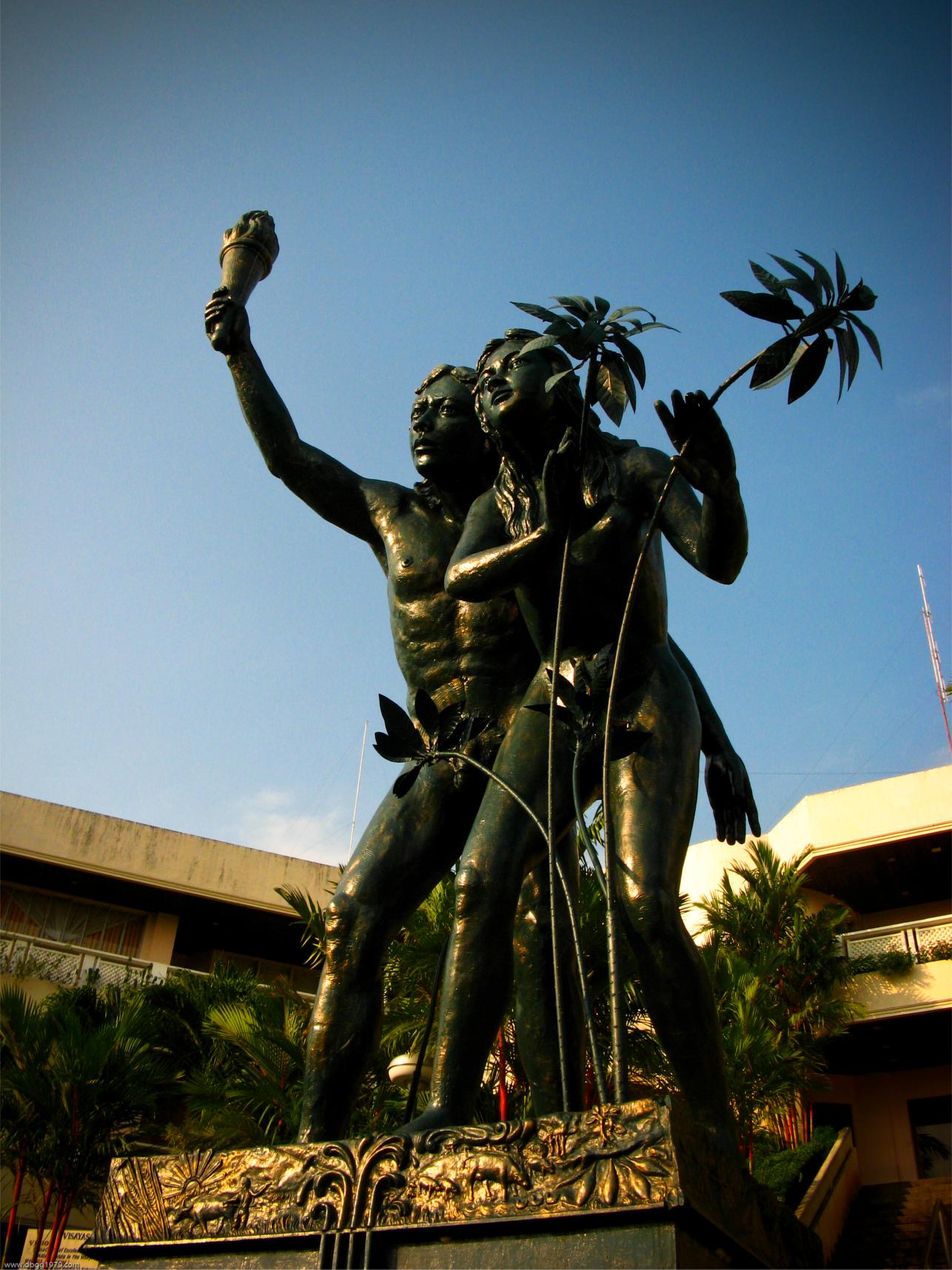 The Search for Truth Statue in front of the Administration Building consists of two gigantic nude figures of a man and a woman, emphasizing partnership in the quest for truth, knowledge, and the professions. Nakedness symbolizes boldness, impartiality and unemcumbered drive in seeking for truth in its academic pursuits. The statue with inscription at its footstall was conceptualized by Dr. Fernando A. Bernardo, the first President of the Visayas State College of Agriculture.
The Search for Truth Statue in front of the Administration Building consists of two gigantic nude figures of a man and a woman, emphasizing partnership in the quest for truth, knowledge, and the professions. Nakedness symbolizes boldness, impartiality and unemcumbered drive in seeking for truth in its academic pursuits. The statue with inscription at its footstall was conceptualized by Dr. Fernando A. Bernardo, the first President of the Visayas State College of Agriculture.
The inscription reads as follows:
"Let search for truth prevail as a dominant activity of university life. For truth is the guiding light in our paramount mission: the pursuit of excellence.
A teacher must foster intellectual curiosity among students and train them in the art and science of searching for truth to achieve excellence - whether in the classroom, in the laboratory, in nature, or in society."
- Identified by the Commission on Higher Education (CHED) as Center of Excellence in Agriculture, Agricultural Engineering, and Forestry (2000) and Zonal Research Center in Region 8 (2000-2003)
- Accredited by the Bureau of Immigration to accept international students into its degree programs (2000)
- Professional Graduates from SY 1953-1954 to SY 2000-2001 totaled 8,522
- Accredited Level II (Enhanced Accredited Status) in Agriculture and Graduate Education Programs by the Accrediting Agency of Chartered Colleges and Universities in the Philippines Inc. (AACCUP) (1999)
- Chosen by CHED as Learning Center for the Massive Upgrading of College Instructors Program for the western part of Leyte, Southern Leyte, and Biliran Provinces since 1998
- Accredited by the Civil Service Commission (CSC) to act on the approval of appointments of personnel and employees since 1994
- Gintong Ani Awardee of the Department of Agriculture (1988)
- Granted a New Zealand Government Technical/Fund Support for the Extramural Program for Rural Development (EPRD) (1985)
- Tanglaw Awardee from the Philippine Council for Agriculture, Forestry, and Natural Resources Research and Development (PCARRD) (1977 and 1980)
- Lead Institution of the Visayas Consortium of Agricultural Resources Program (VICARP) since 1978
- Granted a World Bank (WB) Agricultural Support Fund (1976)
- Multi-commodity research center in the Visayas since 1975
- Zonal Agricultural University in the Visayas since 1975
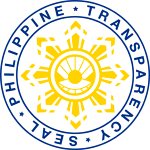
National Budget Circular 542, issued by the Department of Budget and Management on August 29, 2012, reiterates compliance with Section 93 of the General Appropriations Act of FY2012. VSU complies with the Philippines' conditions for good governance by making the following information and documents available below.
VSU Compliance with Sec. 93 (Transparency Seal) R.A. No. 10155 (General Appropriations Act FY 2012)
- Agency's Mandate, Vision, Mission and List of Officials
- Annual Financial Reports
- A. VSU Financial Reports
- FAR No. 1 - Statement of Appropriations, Allotments, Obligations, Disbursements and Balances (SAAODB)
- 2025: 1st Quarter (Continuing, Current) | 2nd Quarter (Continuing, Current) | 3rd Quarter (Continuing, Current)
- 2024: 1st Quarter (Continuing, Current) | 2nd Quarter (Continuing, Current) | 3rd Quarter (Continuing, Current) | 4th Quarter (Continuing, Current)
- 2023: 1st Quarter (Continuing, Current) | 2nd Quarter (Continuing, Current) | 3rd Quarter (Continuing, Current) | 4th Quarter (Continuing, Current)
- 2022: 1st Quarter (Continuing, Current) | 2nd Quarter (Continuing, Current) | 3rd Quarter (Continuing, Current) (Current Re-posted) | 4th Quarter (Continuing, Current)
- 2021: 1st Quarter (Continuing, Current) | 2nd Quarter (Continuing, Current) | 3rd Quarter (Continuing, Current) | 4th Quarter (Continuing, Current)
- 2020: 1st Quarter (Continuing, Current) | 2nd Quarter (Continuing, Current) | 3rd Quarter (Continuing, Current) | 4th Quarter (Continuing, Current)
- 2019: 1st Quarter (Continuing, Current) | 2nd Quarter (Continuing, Current) | 3rd Quarter (Continuing, Current) | 4th Quarter (Continuing, Current)
- 2018: 1st Quarter (Continuing, Current) | 2nd Quarter (Continuing, Current) | 3rd Quarter (Continuing, Current) | 4th Quarter (Continuing, Current)
- 2017: 1st Quarter (Continuing, Current) | 2nd Quarter (Continuing, Current) | 3rd Quarter (Continuing, Current) | 4th Quarter (Continuing, Current)
- 2016: 1st Quarter | 2nd Quarter | 3rd Quarter | 4th Quarter
- 2015: 1st Quarter | 2nd Quarter | 3rd Quarter | 4th Quarter
- 2014: 1st Quarter | 2nd Quarter | 3rd Quarter | 4th Quarter
- FAR No. 1A - Summary of Appropriations, Allotments, Obligations, Disbursements and Balances by Object of Expenditures (SAAODBOE)
- 2025: 1st Quarter (Continuing, Current) | 2nd Quarter (Continuing, Current) | 3rd Quarter (Continuing, Current)
- 2024: 1st Quarter (Continuing, Current) | 2nd Quarter (Continuing, Current) | 3rd Quarter (Continuing, Current) | 4th Quarter (Continuing, Current)
- 2023: 1st Quarter (Continuing, Current) | 2nd Quarter (Continuing, Current) | 3rd Quarter (Continuing, Current) | 4th Quarter (Continuing, Current)
- 2022: 1st Quarter (Continuing, Current) | 2nd Quarter (Continuing, Current) | 3rd Quarter (Continuing, Current) | 4th Quarter (Continuing, Current)
- 2021: 1st Quarter (Continuing, Current) | 2nd Quarter (Continuing, Current) | 3rd Quarter (Continuing, Current) | 4th Quarter (Continuing, Current)
- 2020: 1st Quarter (Continuing, Current) | 2nd Quarter (Continuing, Current) | 3rd Quarter (Continuing, Current) | 4th Quarter (Continuing, Current)
- 2019: 1st Quarter (Continuing, Current) | 2nd Quarter (Continuing, Current) | 3rd Quarter (Continuing, Current) | 4th Quarter (Continuing, Current)
- 2018: 1st Quarter (Continuing, Current) | 2nd Quarter (Continuing, Current) | 3rd Quarter (Continuing, Current) | 4th Quarter (Continuing, Current)
- 2017: 1st Quarter (Continuing, Current) | 2nd Quarter (Continuing, Current) | 3rd Quarter (Continuing, Current) | 4th Quarter (Continuing, Current)
- 2016: 1st Quarter | 2nd Quarter | 3rd Quarter | 4th Quarter
- 2015: 1st Quarter | 2nd Quarter | 3rd Quarter | 4th Quarter
- 2014: 1st Quarter | 2nd Quarter | 3rd Quarter | 4th Quarter
- FAR No. 1B - List of Allotments and Sub-Allotments
- 2025: 1st Quarter | 2nd Quarter | 3rd Quarter
- 2024: 1st Quarter | 2nd Quarter | 3rd Quarter | 4th Quarter
- 2023: 1st Quarter | 2nd Quarter | 3rd Quarter | 4th Quarter
- 2022: 1st Quarter | 2nd Quarter | 3rd Quarter | 4th Quarter
- 2021: 1st Quarter | 2nd Quarter | 3rd Quarter | 4th Quarter
- 2020: 1st Quarter | 2nd Quarter | 3rd Quarter | 4th Quarter
- 2019: 1st Quarter | 2nd Quarter | 3rd Quarter (Continuing, Current) | 4th Quarter
- 2018: 1st Quarter (Continuing, Current) | 2nd Quarter (Continuing, Current) | 3rd Quarter (Continuing, Current) | 4th Quarter (Continuing, Current)
- 2017: 1st Quarter (Continuing, Current) | 2nd Quarter (Continuing, Current) | 3rd Quarter (Continuing, Current) | 4th Quarter (Cuntinuing, Current)
- 2016: 1st Quarter | 2nd Quarter | 3rd Quarter | 4th Quarter
- 2015: 1st Quarter | 2nd Quarter | 3rd Quarter
- 2014: 1st Quarter | 2nd Quarter | 3rd Quarter | 4th Quarter
- FAR No. 1C - Statement of Obligations, Disbursements, Liquidations and Balances for Inter-Agency Fund Transfers
- 2025: 1st Quarter | 2nd Quarter | 3rd Quarter
- 2024: 3rd Quarter | 4th Quarter
- 2019: 3rd Quarter
- FAR No. 2 - Summary of Approved Budget, Utilizations, Disbursements and Balances (SABUDB)
- 2025: 1st Quarter (STF, IGP) | 2nd Quarter (STF, IGP) | 3rd Quarter (STF, IGP)
- 2024: 1st Quarter (STF, IGP) | 2nd Quarter (STF, IGP) | 3rd Quarter (STF, IGP) | 4th Quarter (STF, IGP)
- 2023: 1st Quarter (STF, IGP) | 2nd Quarter (STF, IGP) | 3rd Quarter (STF, IGP) | 4th Quarter (STF, IGP)
- 2022: 1st Quarter (STF, IGP) | 2nd Quarter (STF, IGP) | 3rd Quarter (STF, IGP) | 4th Quarter (STF, IGP)
- 2021: 1st Quarter | 2nd Quarter | 3rd Quarter | 4th Quarter
- 2020: 1st Quarter | 2nd Quarter | 3rd Quarter | 4th Quarter
- 2019: 1st Quarter | 2nd Quarter | 3rd Quarter | 4th Quarter
- 2018: 1st Quarter | 2nd Quarter | 3rd Quarter | 4th Quarter
- 2017: 1st Quarter | 2nd Quarter | 3rd Quarter | 4th Quarter
- 2016: 1st Quarter | 2nd Quarter | 3rd Quarter | 4th Quarter
- 2015: 1st Quarter - 4th Quarter (Consolidated)
- 2014: 1st Quarter | 2nd Quarter | 3rd Quarter | 4th Quarter
- FAR No. 2A - Summary of Approved Budget, Utilizations, Disbursements and Balances by Object of Expenditures (SABUDBOE)
- 2025: 1st Quarter (STF, IGP) | 2nd Quarter (STF, IGP) | 3rd Quarter (STF, IGP)
- 2024: 1st Quarter (STF, IGP) | 2nd Quarter (STF, IGP) | 3rd Quarter (STF, IGP) | 4th Quarter (STF, IGP)
- 2023: 1st Quarter (STF, IGP) | 2nd Quarter (STF, IGP) | 3rd Quarter (STF, IGP) | 4th Quarter (STF, IGP)
- 2022: 1st Quarter (STF, IGP) | 2nd Quarter (STF, IGP) | 3rd Quarter (STF, IGP) | 4th Quarter (STF, IGP)
- 2021: 1st Quarter | 2nd Quarter | 3rd Quarter | 4th Quarter
- 2020: 1st Quarter | 2nd Quarter | 3rd Quarter | 4th Quarter
- 2019: 1st Quarter | 2nd Quarter | 3rd Quarter | 4th Quarter
- 2018: 1st Quarter | 2nd Quarter | 3rd Quarter | 4th Quarter
- 2017: 1st Quarter | 2nd Quarter | 3rd Quarter | 4th Quarter
- 2016: 1st Quarter | 2nd Quarter | 3rd Quarter | 4th Quarter
- 2015: 1st Quarter - 4th Quarter (Consolidated)
- 2014: 1st Quarter | 2nd Quarter | 3rd Quarter | 4th Quarter
- FAR No. 3 - Aging of Unpaid Obligations
- 2024: RAF | IGF | BRF | TF
- 2023: Regular Agency Fund | Internally Generated Fund | Business Related Fund
- 2022: Regular Agency Fund | Internally Generated Fund | Business Related Fund
- 2021: General Fund | Special Trust Fund
- 2020: General Fund | Special Trust Fund
- 2019: General Fund | Special Trust Fund | Special Trust Fund - Updated as of February 4, 2020
- 2018: General Fund | General Fund (4th Quarter) | Special Trust Fund | Special Trust Fund (4th Quarter)
- 2017: General Fund (4th Quarter) | Special Trust Fund (4th Quarter)
- FAR No. 4 - Monthly Report of Disbursements
- 2025: January, February, March, April, May, June, July, August, September, October
- 2024: January, February, March, April, May, June, July, August, September, October, November, December
- 2023: January, February, March, April, May, June, July, August, September, October, November, December
- 2022: January, February, March, April, May, June, July, August, September, October, November, December
- 2021: January, February, March, April, May, June, July, August, September, October, November, December
- 2020: January, February, March, April, May, June, July, August, September, October, November, December
- 2019: January, February, March, April, May, June, July, August, September, October, November, December
- 2018: January, February, March, April, May, June, July, August, September, October, November, December
- 2017: January, February, March, April, May, June, July, August, September, October, November, December
- 2016: July, August, September, October, November, December
- 2015: January, February, March, April, May, June, July, August, September, October, November, December
- 2014: January, February, March, April, May, June, July, August, September, October, November, December
- 2013 | 2012 | 2011 | 2010 | 2009
- FAR No. 5 - Quarterly Report of Revenue and Other Receipts
- 2025: 1st Quarter (IGF, TR, BRF) | 2nd Quarter (IGF, TR, BRF) | 3rd Quarter (IGF, TR, BRF)
- 2024: 1st Quarter (IGP, TF, STF) | 2nd Quarter (IGP, TF, STF) | 3rd Quarter (IGP, TF, STF) | 4th Quarter (IGP, TF, TF Revised as of Feb. 5, 2025, STF)
- 2023: 1st Quarter (IGP, TF, STF) | 2nd Quarter (IGP, TF, STF) | 3rd Quarter (IGP, TF, STF) | 4th Quarter (IGP, TF, STF)
- 2022: 1st Quarter | 2nd Quarter | 3rd Quarter | 4th Quarter
- 2021: 1st Quarter | 2nd Quarter | 3rd Quarter | 4th Quarter | 4th Quarter (Updated as of February 9, 2022)
- 2020: 1st Quarter | 2nd Quarter | 3rd Quarter | 4th Quarter
- 2019: 1st Quarter | 2nd Quarter | 3rd Quarter | 4th Quarter
- 2018: 1st Quarter | 2nd Quarter | 3rd Quarter | 4th Quarter
- 2017: 1st Quarter | 2nd Quarter | 3rd Quarter | 4th Quarter
- 2016: 1st Quarter | 2nd Quarter | 3rd Quarter | 4th Quarter
- 2015: 1st Quarter | 2nd Quarter | 3rd Quarter | 4th Quarter
- 2014: 1st Quarter | 2nd Quarter | 3rd Quarter | 4th Quarter
- 2013 | 2012 | 2011 | 2010 | 2009
- FAR No. 6 - Statement of Approved Budget, Utilizations, Disbursements and Balances for Trust Receipts
- 2025: 1st Quarter | 2nd Quarter | 3rd Quarter
- 2024: 1st Quarter | 2nd Quarter | 3rd Quarter | 4th Quarter
- 2023: 1st Quarter | 2nd Quarter | 3rd Quarter | 4th Quarter
- 2022: 1st Quarter | 2nd Quarter | 3rd Quarter | 4th Quarter
- 2021: 1st Quarter | 2nd Quarter | 3rd Quarter | 4th Quarter
- 2020: 1st Quarter | 2nd Quarter | 3rd Quarter | 4th Quarter | 4th Quarter Updated (February)
- 2019: 1st Quarter (Ending June 2019) | 2nd Quarter | 3rd Quarter | 4th Quarter
- FAR No. 6A- Statement of Approved Budget, Utilizations, Disbursements and Balances for Trust Receipts (PY Accounts Payable)
- 2024: 1st Quarter | 2nd Quarter | 3rd Quarter | 4th Quarter
- BAR No. 1 - Quarterly Physical Report of Operation
- 2025: 1st Quarter | 2nd Quarter | 3rd Quarter
- 2024: 1st Quarter | 2nd Quarter, 2nd Quarter (Updated as of Aug. 21, 2024), 2nd Quarter (Updated as of Sep. 6, 2024) | 3rd Quarter | 4th Quarter
- 2023: 1st Quarter | 2nd Quarter | 3rd Quarter | 4th Quarter
- 2022: 1st Quarter | 2nd Quarter, 2nd Quarter (Updated as of September 8, 2022) | 3rd Quarter | 4th Quarter, (Updated as of Feb 13, 2023), (Updated as of Mar 20, 2023)
- 2021: 1st Quarter | 2nd Quarter | 3rd Quarter | 4th Quarter (Updated as Feb 28, 2023)
- 2020: 1st Quarter, 1st Quarter (Updated as of May 13, 2020) | 2nd Quarter | 3rd Quarter | 4th Quarter
- 2019: 1st Quarter | 2nd Quarter | 3rd Quarter | 4th Quarter
- 2018: 1st Quarter | 2nd Quarter | 3rd Quarter | 4th Quarter
- 2017: 1st Quarter | 2nd Quarter | 3rd Quarter | 4th Quarter
- 2016: 1st Quarter | 2nd Quarter | 3rd Quarter | 4th Quarter
- 2015: 1st Quarter | 2nd Quarter | 3rd Quarter
- 2014 | 2013 | 2012 | 2011 | 2010 | 2009
- BED No. 1 - Financial Plan
- BED No. 2 Physical Plan
- BED No. 3 - Monthly Disbursement Program
- 2026 | 2025 (GAA), 2025| 2024 (GAA), 2024 | 2023 | 2022 | 2021 | 2020 | 2019
- Statement of Allotment, Obligation and Balances
- Financial Report of Operation
- FAR No. 1 - Statement of Appropriations, Allotments, Obligations, Disbursements and Balances (SAAODB)
- B. Annual Reports on the Status of Income Authorized by Law to be Deposited Outside the National Treasury
- 2018
- 2017
- Statement of Financial Position
- Detatiled Comparative Statement of Financial Position
- Comparative Statement of Financial Performance
- Comparative Detailed Statement of Financial Performance
- Statement of Changes in Net Assets
- Statement of Comparison of Budget and Actual Amount (Internally-Gnerated)
- Statement of Comparison of Budget and Actual Amount (Regular Fund)
- Comparative Statement of Cash Flow CY 2016-2017
- Statement for Management's Responsibility 2017
- Revised Notes to FS 2017
- A. VSU Financial Reports
- DBM Approved Budget and Corresponding Targets
- VSU Approved Budget
- VSU Corresponding Targets
- Projects, Programs and Activities, Beneficiaries, and Status of Implementation
- Annual Procurement Plan (APP)
- APP Non-Common-use Supplies and Equipment (APP non-CSE)
- 2026
- 2025
- Indicative FY 2025 APP non-CSE | Indicative FY 2025 non-CSE (as per NEP) | Indicative FY 2025 non-CSE (as per NEP) - Revised with Other Funds | FY 2025 APP non-CSE | FY 2025 APP non-CSE (updated March 15, 2025): https://drive.google.com/file/d/1kSgUbaAx1ElzVXu-DfVOiEqNKHSl4yyM/view?usp=sharing | FY 2025 APP Supplemental 03 | FY 2025 APP Supplemental 04 | FY 2025 APP (updated as of June 30, 2025) | Updated FY 2025 APP (Version No. 06)
- 2024
- FY 2024 APP non-CSE | FY 2024 Supplemental APP 01 | FY 2024 Supplemental APP 02 | FY 2024 APP (updated as of June 5, 2024) | FY 2024 APP (updated as of June 30, 2024) | FY 2024 Supplemental APP 06 | FY 2024 APP non-CSE (updated as of December 31, 2024)
- Indicative FY 2024 APP non-CSE | Indicative FY 2024 APP non-CSE (based on NEP)
- 2023
- FY 2023 APP non-CSE | FY 2023 Supplemental APP 01 | FY 2023 Supplemental APP 02 | FY 2023 Supplemental APP 03 | FY 2023 APP non-CSE (updated as of June 30, 2023) | FY 2023 Supplemental APP 04 | FY 2023 Supplemental APP 05 | FY 2023 Supplemental APP 06 | FY 2023 APP non-CSE (updated as of December 31, 2023)
- Indicative FY 2023 APP non-CSE (updated as of September 2022) - Revised
- Indicative FY 2023 APP non-CSE (updated as of September 2022)
- Indicative FY 2023 APP non-CSE
- 2022
- FY 2022 APP non-CSE | FY 2022 Supplemental APP 01 | FY 2022 Supplemental APP 02 | FY 2022 Supplemental APP 02-A (VSU Main) | FY 2022 APP non-CSE (updated as of June 30, 2022) | FY 2022 Supplemental APP 03 | FY 2022 Supplemental APP 04 | FY 2022 Supplemental APP 05 | FY 2022 Supplemental APP 06 | FY 2022 APP non-CSE (updated as of December 31, 2022)
- Indicative FY 2022 APP non-CSE (Revised as of September 2021)
- Indicative FY 2022 APP
- 2021
- FY 2021 APP non-CSE | FY 2021 Supplemental APP 01 | FY 2021 Supplemental 01-A (Component Colleges) | FY 2021 Supplemental APP 02 | FY 2021 APP non-CSE (updated as of June 30, 2021) | FY 2021 Supplemental APP 03 | FY 2021 Supplemental APP 04 | FY 2021 Supplemental APP 05 | FY 2021 APP (updated as of December 2021)
- Indicative FY 2021 APP non-CSE (Updated)
- Indicative FY 2021 APP non-CSE
- 2021 Indicative APP
- 2020
- 2019
- APP 2018 - Supplement 01 | APP 2018 (Revised) | APP 2018
- APP 2017 | Revised APP 2017
- APP 2016 | APP 2016 - Supplement 01 | APP 2016 - Supplement 02
- APP 2015 | APP 2015 - Supplement 01 | APP 2015 - Supplement 02 | APP 2015 - Supplement 03
- APP 2014 | APP 2014 - Supplement 01
- APP 2013
- PPMP FY 2018 and 2019
- APP Common-use Supplies and Equipment (APP-CSE)
- APP Non-Common-use Supplies and Equipment (APP non-CSE)
- QMS Certification
-
- 2023
- 2021
- 2020
- 2019
- Transmittal Letter to the Director of the Systems Productivity Incentive Bureau of DBM re: Compliance of the QMS Certification requirement for PBB 2019
- AACCUP Institutional Accreditation Level III Award for VSU (Certified True Copy by the University President)
- AACCUP Institutional Accreditation Level III Award for VSU (Certified True Copy by the Director for Admin. & Human Resource Development)
- Letter from DBM re: AACCUP Award in lieu of ISO Certification
- 2018
- System of Ranking of Delivery Units and Individuals in the Grant of PBB
- 2021
- For FY 2021 PBB, the delivery units of eligible agencies shall no longer be ranked. However, the unit/s most responsible for deficiencies shall be isolated. (Section 6.0 – Eligibility of Delivery Units and Individuals, AO25 MC No. 2021-1, issued on 3 June 2021)
- The University will follow to what is prescribed in the Memorandum Circular No. 2021-1 Section 6.0 issued by the Inter-Agency Task Force on the Harmonization of National Government Performance Monitoring, Information and Reporting Systems on 3 June 2021, regarding Eligibility of Delivery Units and Individuals.
- System of Ranking Used in the Grant of 2020 PBB
- System of Ranking Used in the Grant of 2019 PBB
- System of Ranking Used in the Grant of 2018 PBB
- System of Ranking Used in the Grant of 2017 PBB
- System of Ranking Used in the Grant of 2016 PBB
- System of Ranking Used in the Grant of 2015 PBB
- 2021
- The Agency Review and Compliance Procedure of Statements and Financial Disclosures
- SALN Submission/Filing
- Certifications and List of VSU employees who submitted and didn't submit SALN CY 2024
- Certifications and List of VSU employees who submitted and didn't submit SALN CY 2023
- Certifications and List of VSU employees who submitted and didn't submit SALN CY 2022
- 2022 Agency Review and Compliance Procedure in the Filing and Submission of SALN and Disclosure of Business Interest and Financial Connections
- Certifications and List of VSU employees who submitted and didn't submit SALN CY 2021
- 2021 Agency Review and Compliance Procedure in the Filing and Submission of SALN and Disclosure of Business Interest and Financial Connections
- 2021 Review and Compliance Committee for SALN
- 2021 Review and Compliance Procedure in the Filling and Submission of SALN and Disclosure of Business Interest and Financial Connections
- Certifications and List of VSU employees who submitted and didn't submit SALN CY 2020
- Certifications and List of VSU employees who submitted and didn't submit SALN CY 2019
- 2020 Review and Compliance Procedure in the Filling and Submission of SALN and Disclosure of Business Interest and Financial Connections
- 2019 Review and Compliance Procedure in the Filing and Submission of SALN and Disclosure of Business Interest and Financial Connections
- 2019 Submission of 2018 SALN of VSU Employees
- 2018 Submission of 2017 SALN of VSU Employees
- 2018 Certificate of Agency Review and Compliance Procedure of SALN
- 2016 Certificate of Compliance on SALN Submission/Filing
- 2015 Certificate of Compliance on SALN Submission/Filing
- 2014 Certificate of Compliance on SALN Submission/Filing
- SALN Submission/Filing
- VSU People's Manual
- VSU Approved Manual
- VSU Quality Manual
- BOR Approved Manuals
- BOR Resolution No. 34, s. 2016 Faculty Manual of 2010
- BOR Resolution No. 35, s. 2016 Administrative Manual of 2010
- BOR Resolution No. 36, s. 2016 Employees Manual of 2010
- BOR Resolution No. 37, s. 2016 Quality Manual of 2015
- BOR Resolution No. 38, s. 2016 Undergraduate Student Handbook of 2014
- BOR Resolution No. 39, s. 2016 Library Manual of 2016
- BOR Resolution No. 40, s. 2016 Research Manual of 2014
- Modifications made pursuant to the general and special provisions in the FY 2018 GAA
- Not Applicable
- VSU Score Cards for Performance Based Bonus (PBB)
- FY 2023
- FY 2022
- FY 2021
- FY 2020
- FY 2019
- FY 2018
- FY 2017
- FY 2016
- FY 2015
- Report of Ageing of Cash Advances
- Report on Sustained Compliance with Audit Findings
- Report on Sustained Audit Findings as of December 19, 2024
- Report on Sustained Audit Findings as of December 29, 2023
- Report on Sustained Audit Findings as of December 29, 2022
- Report on Sustained Audit Findings as of December 29, 2021
- Report on Status of Prior Years' Recommendation (Sustained Audit Findings) as of December 22, 2020
- Report on Sustained Audit Findings as of December 23, 2019
- Agency Action Plan & Status of Implementation updated 2018
- Certifications
- VSU FOI Certificate of Compliance
- Certification of Compliance for Citizen's Charter
- Certification on Stage 1 Audit under ISO 9001:2008
- Transparency Seal (TS)
- Agency Procurement Compliance and Performance Indicator (APCPI)
- Other Reports and Documents
- President's Travel
- Document: Financial Statement 2014
- Document: Officers and Employees Submission of SALN
- File: ISO Stage 1 Audit Report
- Center of Excellence for Agriculture Certificate
- Center of Excellence for Agricultural Engineering Certificate
- Center of Excellence for Development Communication Certificate
- Certificate of Program Compliance for Bachelor of Science in Agriculture
- Certificate of Program Compliance for Bachelor of Science in Agricultural and Biosystems Engineering
- Certificate of Program Compliance for Bachelor of Science in Development Communication
- Certicate of Appreciation: Inter-Collegiate Debate on Federalism
- Certificate of Recognition: Best Team in Inter-Collegiate Debate on Federalism
- Bids and Awards Committee
- Undertaking of Early Procurement Activities (EPA)
- PhilGEPS Justification of Non-Compliance of Posting
- Procurement Monitoring Report (PMR)
- 2025
- 2024
- 2023
- 2022
- 2021
- 2020
- VSU Capital Outlay Projects
The governance and administration of VSU as set forth in Republic Act (RA) No. 9437 and duly constituted by RA 8292 are vested in the Board of Regents (BOR) and the President of the University as authorized by the Board.
The Board of Regents is composed of the following:
- Chairman of the Commission on Higher Education (CHED), Chairman
- VSU President, Vice Chairman
- Chairman of the Committee on Education of the Philippine Senate, Member
- Chairman of the Committee on Higher and Technical Education of the Philippine House of Representatives, Member
- Regional Director of the National Economic Development Authority (NEDA), Member
- Regional Director of the Department of Agriculture (DA), Member
- President of the VSU Faculty Association, Member
- President of the VSU Alumni Association, Member
- President of the VSU Supreme Student Council, Member
- Two (2) Prominent Citizens in the Region, Members
Past Administrators
The following served as administrators of the University:
1924 - Washington Wiren, Principal (Baybay Agricultural School)
1933 - Robert Kilbourne, Principal (Baybay Agricultural High School-BAHS)
1935 - Fred Warner, Principal (BAHS)
1938 - Fred Warner, Superintendent (Baybay National Agricultural School-BNAS)
1949 - Pedro Montellano, Superintendent (BNAS)
1949 - Dominador D. Clemente, Superintendent (BNAS)
1958 - Amado C. Tolentino, Superintendent (BNAS)
1960 - Julian Mamaril, Superintendent (Visayas Agricultural College-VAC)
1963 - Napoleon D. Dignadice, Superintendent (VAC)
1971 - Rafael G. Macahilig, Superintendent (VAC)
1974 - Dr. Fernando A. Bernardo, President (Visayas State College of Agriculture-ViSCA)
1986 - Dr. Marianito R. Villanueva, President (ViSCA)
1993 - Dr. Samuel S. Go, President (ViSCA)
1999 - Dr. Paciencia P. Milan, President (ViSCA)
2001 - Dr. Paciencia P. Milan, President (Leyte State University-LSU)
2007 - Dr. Paciencia P. Milan, President (Visayas State University-VSU)
2007 - Dr. Jose L. Bacusmo, President (VSU-Effective November 1, 2007)
2011 - Dr. Jose L. Bacusmo, President (Visayas State University)
2015 to date - Dr. Edgardo E. Tulin (Effective November 2015)
Vision
A global green university providing progressive leadership in agriculture, science & technology, education and allied fields for societal transformation.
Mission
To produce graduates equipped with advanced knowledge and lifelong learning skills with ethical standards through high quality instruction, innovative research, and impactful community engagements.
Guiding Principles
Service: At the heart of VSU is our commitment to service. This value underscores the importance of selflessness, dedication and a relentless pursuit of the greater good. By promoting a culture of service, the university aims to nurture servant leaders and compassionate human resource dedicated to making a positive impact on the society
Truth: Emphasizing the significance of honesty, transparency, and a steadfast commitment to facts. The value of truth guides VSU’s academic and administrative endeavors. A university whose guiding principle is built on truth is essential for promoting a community of trust and mutual respect. It is in accord with facts and reality and connotes sincerity in action, character and utterance. The character of an institution is shaped by its ability to stand by the truth and make use of it. The search for truth, the very essence of the academic institution, is the backbone of the scientific process where certainty of results is tested against all known facts. The University is an institution that stands by the truth, reasons in accordance with facts and manifests sincerity in utterance, action and character; and
Resilience: In an ever-changing world, resilience is a critical trait. VSU champions the ability to adapt, overcome challenges and emerge stronger. This value is integral to ensure that VSU remains agile, future-ready and capable of thriving amidst adversity.
Integrity: Upholding the highest standards of ethical behavior. It signifies a steadfast commitment to moral principles, accountability and the pursuit of justice in all university affairs. The firm adherence to an upright moral code and ethical standards is vital in the University's search for truth. An institution engaged in producing quality human capital and scientific innovation must remain incorruptible in a morally challenging environment. Integrity is crucial in forging synergistic partnerships between the University and its stakeholders. Partnerships founded upon integrity practice transparency and mutual trust;
Discipline: Recognizing the importance of temperance, diligence, grit, and a strong work ethic, the value of discipline is vital for achieving personal and institutional goals. VSU strives to instill this value in every member of the VSU community to foster a culture of excellence and impact.
Excellence: Excellence is a non-negotiable standard. This value drives the university’s pursuit of the highest quality in education, research and community service. By continuously raising the bar, VSU aims to produce world class graduates, innovative research and impactful community engagements. A value that centers on the imminent goodness of the quality of services, systems, and outputs of the University. An institution that consistently lives by excellent standards in anything that it does is effective in its search for truth and delivery of socially-relevant, scientific and technological contributions. The stakeholders of the University that includes its students, producers and industries deserve nothing but the best that the institution can offer.
Social Justice: Committed to fostering an inclusive and equitable environment, the value of social justice ensures that all members of the VSU community have equal access to opportunities and resources. The university aspires to contribute in building a progressive and just society by developing human resources who will become agents of positive change. VSU advocates for fairness, equity and the eradication of discrimination in all its forms
Strategic Objectives
- Sustain academic excellence compliant with statutory standards, aligned with Fourth Industrial Revolution (4IR), Education 5.0, and sustainable development goals.
- Establish greate and wider internationalization, perfoemance and global reputation.
- Implement holistic student development programs and services to other stakeholders for a meaningful university life experience.
- Equip students with 21st-century and industry- required skills (communication, creativity, critical thinking, collaboration, ethical behavior).
- Produce innovative and high-impact research providing cutting-edge and practical solutions to local, national, and international problems and challenges.
- Implement impactful community engagements and establish relevant partnerships and collaborations.
- Intelligent and prudent financial investments on green and smart infrastructure, laboratory and research facilities.
- Implement effective public and private partnerships to harness potential income from the university's tangible and intangible assets.
- Establish strong alumni networks and benefactors.
- Sustain certification and accreditaion of programs and management processes to include but not limited to talents/employees, operations, financial assets, transparency, and accountability.
- Implement automation and digitalization of asset management, processes and systems.
- Strengthen the PRIME-HRM framework fostering competency driven culture and transfomative transactions in VSU.
- Invigorate VSU with its resolute commitment to gender equality and to its re-affirmed guiding principles (values).
- Efficient and effective implementation of the Strategic Performance and Management System for equity and fairness in managing careers and talents in VSU.
Vision
A global green university providing progressive leadership in agriculture, science & technology, education and allied fields for societal transformation.
Mission
To produce graduates equipped with advanced knowledge and lifelong learning skills with ethical standards through high quality instruction, innovative research, and impactful community engagements.
Guiding Principles
Service: At the heart of VSU is our commitment to service. This value underscores the importance of selflessness, dedication and a relentless pursuit of the greater good. By promoting a culture of service, the university aims to nurture servant leaders and compassionate human resource dedicated to making a positive impact on the society
Truth: Emphasizing the significance of honesty, transparency, and a steadfast commitment to facts. The value of truth guides VSU’s academic and administrative endeavors. A university whose guiding principle is built on truth is essential for promoting a community of trust and mutual respect. It is in accord with facts and reality and connotes sincerity in action, character and utterance. The character of an institution is shaped by its ability to stand by the truth and make use of it. The search for truth, the very essence of the academic institution, is the backbone of the scientific process where certainty of results is tested against all known facts. The University is an institution that stands by the truth, reasons in accordance with facts and manifests sincerity in utterance, action and character; and
Resilience: In an ever-changing world, resilience is a critical trait. VSU champions the ability to adapt, overcome challenges and emerge stronger. This value is integral to ensure that VSU remains agile, future-ready and capable of thriving amidst adversity.
Integrity: Upholding the highest standards of ethical behavior. It signifies a steadfast commitment to moral principles, accountability and the pursuit of justice in all university affairs. The firm adherence to an upright moral code and ethical standards is vital in the University's search for truth. An institution engaged in producing quality human capital and scientific innovation must remain incorruptible in a morally challenging environment. Integrity is crucial in forging synergistic partnerships between the University and its stakeholders. Partnerships founded upon integrity practice transparency and mutual trust;
Discipline: Recognizing the importance of temperance, diligence, grit, and a strong work ethic, the value of discipline is vital for achieving personal and institutional goals. VSU strives to instill this value in every member of the VSU community to foster a culture of excellence and impact.
Excellence: Excellence is a non-negotiable standard. This value drives the university’s pursuit of the highest quality in education, research and community service. By continuously raising the bar, VSU aims to produce world class graduates, innovative research and impactful community engagements. A value that centers on the imminent goodness of the quality of services, systems, and outputs of the University. An institution that consistently lives by excellent standards in anything that it does is effective in its search for truth and delivery of socially-relevant, scientific and technological contributions. The stakeholders of the University that includes its students, producers and industries deserve nothing but the best that the institution can offer.
Social Justice: Committed to fostering an inclusive and equitable environment, the value of social justice ensures that all members of the VSU community have equal access to opportunities and resources. The university aspires to contribute in building a progressive and just society by developing human resources who will become agents of positive change. VSU advocates for fairness, equity and the eradication of discrimination in all its forms
Strategic Objectives
- Sustain academic excellence compliant with statutory standards, aligned with Fourth Industrial Revolution (4IR), Education 5.0, and sustainable development goals.
- Establish greater and wider internationalization, perfoemance and global reputation.
- Implement holistic student development programs and services to other stakeholders for a meaningful university life experience.
- Equip students with 21st-century and industry- required skills (communication, creativity, critical thinking, collaboration, ethical behavior).
- Produce innovative and high-impact research providing cutting-edge and practical solutions to local, national, and international problems and challenges.
- Implement impactful community engagements and establish relevant partnerships and collaborations.
- Intelligent and prudent financial investments on green and smart infrastructure, laboratory and research facilities.
- Implement effective public and private partnerships to harness potential income from the university's tangible and intangible assets.
- Establish strong alumni networks and benefactors.
- Sustain certification and accreditation of programs and management processes to include but not limited to talents/employees, operations, financial assets, transparency, and accountability.
- Implement automation and digitalization of asset management, processes and systems.
- Strengthen the PRIME-HRM framework fostering competency driven culture and transformative transactions in VSU.
- Invigorate VSU with its resolute commitment to gender equality and to its re-affirmed guiding principles (values).
- Efficient and effective implementation of the Strategic Performance and Management System for equity and fairness in managing careers and talents in VSU.
Quality Policy Statement
In our pursuit for excellence, the Visayas State University commits to provide progressive leadership to develop human resource equipped with knowledge and lifelong learning skills aligned with ethical standards and guiding principles towards impactful social transformation.
We commit to foster transparency and stewardship by meeting international standards through a culture of quality instruction, research and innovation, empower stakeholders and provide adequate resources to achieve strategic objectives through continuous improvement and shared responsibility in upholding the institution’s vision as a global green university.
V03 02-25-2025
History
From BAS. To BNAS. To VAC. To ViSCA. To LSU. Now VSU.
The institution was established on June 2, 1924 as the Baybay Agricultural School (BAS) through a Provincial Board Resolution.
In 1934, it was renamed Baybay Agricultural High School (BAHS) and was later converted into the Baybay National Agricultural School (BNAS) with the approval of Commonwealth Act No. 313 in 1938.
BNAS was converted into the Visayas Agricultural College (VAC) by virtue of Republic Act (RA) No. 2831 issued on June 19, 1960.
The institution attained rapid growth and development following its conversion into Visayas State College of Agriculture (ViSCA) on May 24, 1974 through Presidential Decree (PD) No. 470 and amended by PD No. 700 on May 12, 1975. In 1999, four institutions of higher education in the province of Leyte were integrated into the College to create a five-campus ViSCA system.
ViSCA became Leyte State University (LSU) through RA No. 9158 issued on August 11, 2001. LSU became Visayas State University (VSU) on April 27, 2007 by virtue of RA No. 9437.
VSU’s mandate is the Visayas. The establishment of VSU realized the thrust of the Philippine government to develop three Zonal Agricultural Universities (ZAU’s) – to serve major regions of the country: for the Visayas, Visayas State University (VSU); for Mindanao, the Central Mindanao University (CMU); and for Luzon, the Central Luzon State University (CLSU).
Awards & Achievements
- Identified by the Commission on Higher Education (CHED) as Center of Excellence in Agriculture, Agricultural Engineering, and Forestry (2000) and Zonal Research Center in Region 8 (2000-2003)
- Accredited by the Bureau of Immigration to accept international students into its degree programs (2000)
- Professional Graduates from SY 1953-1954 to SY 2000-2001 totaled 8,522
- Accredited Level II (Enhanced Accredited Status) in Agriculture and Graduate Education Programs by the Accrediting Agency of Chartered Colleges and Universities in the Philippines Inc. (AACCUP) (1999)
- Chosen by CHED as Learning Center for the Massive Upgrading of College Instructors Program for the western part of Leyte, Southern Leyte, and Biliran Provinces since 1998
- Accredited by the Civil Service Commission (CSC) to act on the approval of appointments of personnel and employees since 1994
- Gintong Ani Awardee of the Department of Agriculture (1988)
- Granted a New Zealand Government Technical/Fund Support for the Extramural Program for Rural Development (EPRD) (1985)
- Tanglaw Awardee from the Philippine Council for Agriculture, Forestry, and Natural Resources Research and Development (PCARRD) (1977 and 1980)
- Lead Institution of the Visayas Consortium of Agricultural Resources Program (VICARP) since 1978
- Granted a World Bank (WB) Agricultural Support Fund (1976)
- Multi-commodity research center in the Visayas since 1975
- Zonal Agricultural University in the Visayas since 1975
Location & Facilities
Physical Features
The VSU-Main Campus has a total land area of 1,099.4 hectares that extends from the shore of Camotes Sea to the top of Mt. Pangasugan. It comprises the following:
| Campus Grounds | 61.6 ha. |
| Research/Experiments | 94.0 ha. |
| Instruction | 3.0 ha. |
| Production Area | 104.3 ha. |
| Pasture Area | 114.0 ha. |
| Forest Reservation | 574.2 ha. |
| Coconut | 62.3 ha. |
| Abaca | 25.0 ha. |
| Rice | 7.0 ha. |
| Orchard | 5.0 ha. |
| Corn | 3.0 ha. |
| Coffee | 2.0 ha. |
| Roads, Creeks/Marshy Areas | 44.0 ha. |
Buildings
The University main campus has 188 buildings: 21 student dormitories, 75 staff houses, 17 academic buildings, 2 Administration buildings, and 63 others which include the Main Library, Student Union, Convention Center, Center for Continuing Education, Infirmary, Guesthouse, Hostel, Pavilion, Cebu and Manila offices, market, cafeteria, high school, elementary, workshop, DA auxiliary, gymnatorium, marine laboratory, fuel depot, power house, motor pool, garage, nurseries, barns, and 9 research/training centers as follows:
- Philippine Root Crop Research and Training Center (PhilRootcrops)
- National Abaca Research Center (NARC)
- National Coconut Research Center (NCRC) - Visayas
- Farm and Resource Management Institute (FARMI)
- Institute for Strategic Research and Development Studies (ISRDS)
- Philippine Carabao Center (PCC) - Leyte
- Agricultural Training Institute-Regional Training Center (ATI-RTC) - Visayas
- Multi-Media Development Center (MMDC)
- Institute of Tropical Ecology and Environmental Science (ITE)
- Advanced Research and Innovation Center (ARIC)


